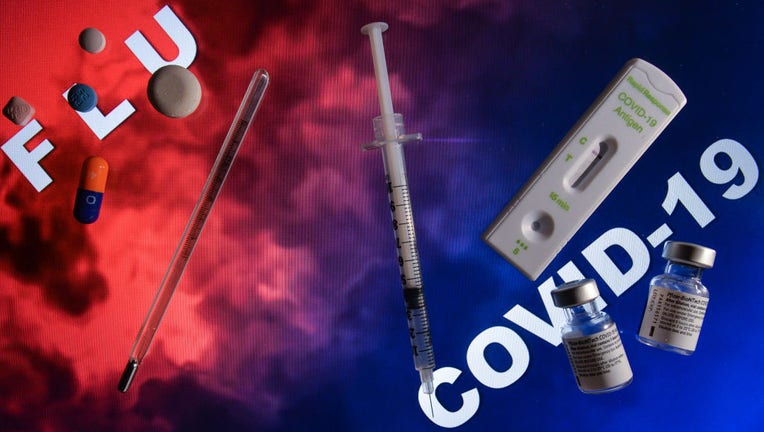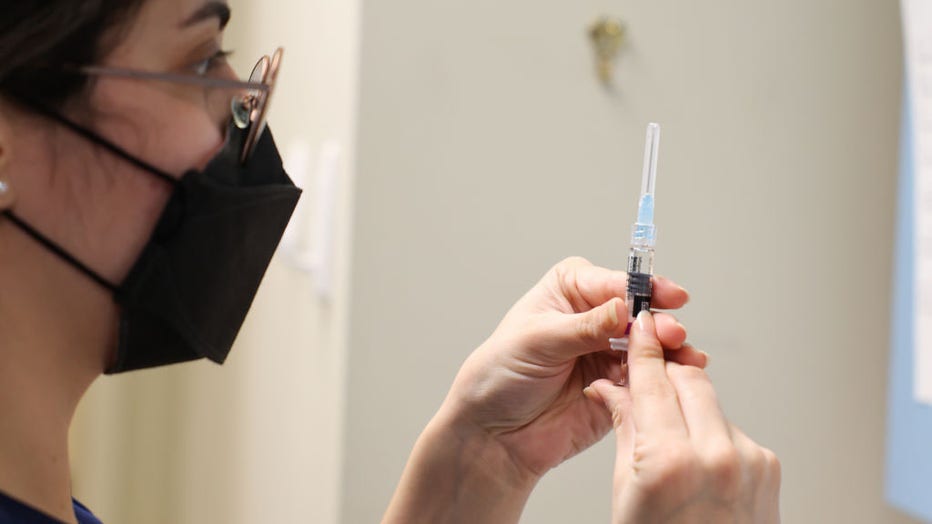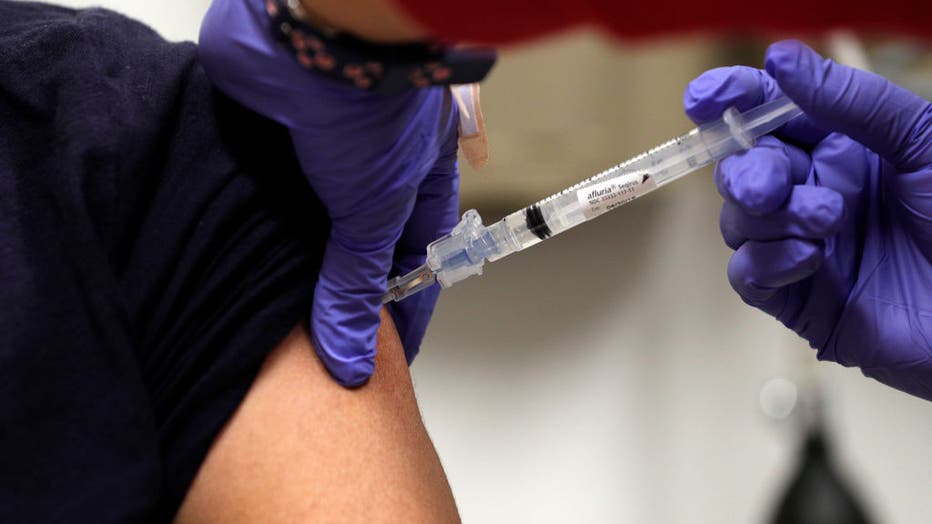Should I get the new COVID booster and flu shot at the same time? Your questions, answered

FILE - An illustrative image of a medical thermometer, flu medication, medical syringe, Covid-19 Antigen Rapid test, and Covid-19 vaccine vials. (Photo by Artur Widak/NurPhoto via Getty Images)
With flu season approaching in the United States, as well as the availability of the updated COVID-19 booster for everyone age 12 and older, some may have questions about these vaccines and when to get them.
Is there a best time to get the flu shot? And is it OK to receive both the seasonal flu shot and the new COVID-19 booster designed to target circulating omicron strains at the same time? Can kids get both during the same visit?
Here are some answers to common questions:
Should I get the new omicron-specific booster and flu shot at the same time?
Yes, you can get a COVID-19 vaccine, including a COVID-19 booster shot, and a flu vaccine at the same time if you are eligible and the timing coincides, the U.S. Centers for Disease Control and Prevention states on its website. The patient can receive one in each arm.
The CDC notes that while both vaccines can be given at the same visit, people should be sure to follow the recommended schedule for either vaccine.
"If you haven’t gotten your currently recommended doses of COVID-19 vaccine, get a COVID-19 vaccine as soon as you can, and ideally get a flu vaccine by the end of October," the CDC says.
The agency adds that experience with other vaccines has shown that the immune response, and possible side effects after getting vaccinated, "are generally the same when given alone or with other vaccines."
Is it safe to get the COVID-19 booster and flu shot at the same time?
Studies conducted throughout the COVID-19 pandemic indicate that it is safe to get both a COVID-19 vaccine and a flu vaccine at the same visit, the CDC says.
A CDC study published this summer in JAMA suggests that people who received a flu shot and an mRNA COVID-19 booster vaccine simultaneously were slightly more likely (8% to 11%) to report systemic reactions including fatigue, headache, and muscle ache, compared to people who only received a booster shot. But the study said these reactions were mostly mild and resolved quickly.
The study findings were consistent with safety data from clinical trials that did not identify any serious safety concerns with co-administration, the agency says.
Those with concerns about getting both the flu shot and COVID-19 booster at the same time should speak with their health care provider.
Can children get a COVID-19 vaccine and flu shot at the same time?
Yes, children who are eligible for COVID-19 vaccination can get a COVID shot and a flu vaccine at the same visit, the CDC says.
"If your child is eligible, get them up to date on their recommended COVID-19 vaccine and annual flu vaccine as soon as possible. You can get both vaccines at the same time, but don’t delay either vaccination in order to get them both at the same visit," the agency states on its website.
Children 6 months and older are recommended to get a flu vaccine and most only need one dose, the CDC says. Typically, at least half of U.S. adults get a flu shot each year.
When is the best time to get a flu shot?
The annual flu vaccination is recommended for everyone 6 months and older, with a few exceptions, in preparation for flu season occurring in the fall and winter.
The CDC says that while flu viruses spread year-round, most of the time flu season peaks between December and February — and activity can sometimes last as late as May.
It’s best to get the shot before the flu begins spreading in the community, the agency says. September and October are generally good times to be vaccinated against flu, and ideally, everyone should be vaccinated by the end of October, it adds.
"However, even if you are not able to get vaccinated until November or later, vaccination is still recommended because flu most commonly peaks in February, and significant activity can continue into May," the CDC states on its website.
Since there are many flu viruses, and they are constantly changing, the U.S. flu vaccines are reviewed annually and updated as needed, including for the 2022-2023 season.

FILE - A nurse prepares a flu shot at Huntington Village Pediatrics, in Huntington, New York on Dec. 8, 2021. (Photo by Steve Pfost/Newsday RM via Getty Images)
What are the new COVID-19 boosters, and should I get one?
The new combination or "bivalent" COVID-19 shots contain half the original vaccine that’s been used since December 2020 and a half protection against today’s dominant omicron versions, BA.4 and BA.5.
Updated shots made by Pfizer-BioNTech are authorized for anyone 12 and older, and rival Moderna’s version is for adults. They’re to be used as a booster for anyone who’s already had their primary vaccination series — using shots from any U.S.-cleared company — and regardless of how many boosters they’ve already gotten.
For those who got the original COVD-19 booster, there is a minimum wait time of two months for the new one, as set by the FDA. But advisers to the CDC said it’s better to wait even longer. Some advise at least three months, another said someone who’s not at high risk might wait as long as six months.
"If you wait a little more time, you get a better immunologic response," said CDC adviser Dr. Sarah Long of Drexel University.
That’s because someone who recently got a booster already has more virus-fighting antibodies in their bloodstream. Antibodies gradually wane over time, and another shot too soon won’t offer much extra benefit, John Wherry, a University of Pennsylvania immunologist who wasn’t involved with the government’s decision-making, previously told the Associated Press.
The basic ingredients used in both omicron-targeting updated vaccines are the same. Testing by Pfizer and Moderna of their BA.1-targeted versions proved safe in human studies and CDC’s advisers concluded the additional small recipe change should be no different.
Flu vaccines are updated every year without human trials.
Is there a combo flu-COVID-19 shot?

FILE - A person gets a flu vaccine shot at the Kaiser Permanente Redwood City hospital in Redwood City, Calif., on Dec. 28, 2017. (Photo By Carlos Avila Gonzalez/The San Francisco Chronicle via Getty Images)
Companies like Moderna have been working to develop a combination vaccine against SARS-CoV-2, influenza, and RSV, which is still in the early stages of development.
Francesca Ceddia, MD, senior vice president of respiratory vaccines at Moderna, told Pharmacy Times last month that the vaccine candidate is currently in the preclinical stage, but the company hoped to begin a phase 1 clinical trial by the end of 2022.
This story was reported from Cincinnati. The Associated Press contributed.

